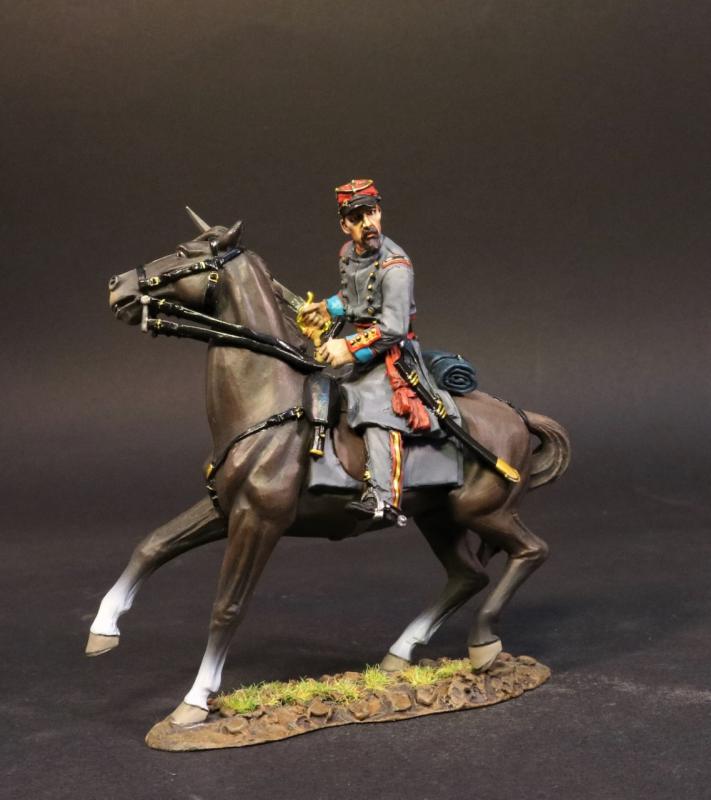Lt. Col. Noah L. Farnham, 11th Regiment New York Volunteer Infantry, the First Battle of Bull Run, 1861, ACW--single mounted figure
$108.00
Item Number: 11NY-01
Lt. Col. Noah L. Farnham, 11th Regiment New York Volunteer Infantry, the First Battle of Bull Run, 1861, ACW
The 11th Regiment New York Volunteer Infantry was an infantry regiment of the Union army in the early years of the American Civil War. The regiment was organized in New York City in May 1861 as a zouave regiment, known for its unusual dress and drill style, by Colonel Elmer E. Ellsworth, a personal friend of US president Abraham Lincoln.
The troops were drawn from the ranks of the city’s many volunteer fire companies, and the unit was also known as the Ellsworth Zouaves, First Fire Zouaves, First Regiment New York Zouaves, and US National Guards.
The unit was among the first to occupy the territory of a Confederate state when it captured Alexandria, Virginia on May 24th 1861, less than 24 hours after the commonwealth seceded from the Union.
The regiment then went on to suffer extensive casualties during the First Battle of Bull Run, during the fighting on Henry House Hill, and whilst serving as a rearguard for the retreating Union army.
The regiment would later be stationed near Hampton Roads during the Peninsula Campaign, but experienced little fighting. It was sent back to New York city in May 1862, and the regiment was mustered out of service on June 1862.
There were several attempts to reorganize as a light infantry regiment through the summer of 1863, and many new enlistees were involved in suppressing the New York Draft riots. This was to fail and the enlistees were transferred to the 17th New York Veteran Volunteer Infantry Regiment.
Ellsworth’s Fire Zouaves marched to Manassas in their zouave jackets and trousers, with red firemen’s shirts and blue fezzes. In the July heat the zouave jackets were abandoned, and most men continued in their red or white firemen’s shirts, and some even added havelock-covered kepis to replace the fezzes. With the officers dressed in Grey, this gave the unit, a motley, multi coloured appearance.
When the Commonwealth of Virginia seceded from the Union on May 23rd, the 11th Regiment New York Volunteer Infantry was ordered to assist in the occupation of Arlington Heights and Alexandria, Virginia, directly across the Potomac River from Washington. On May 24th, the regiment boarded the steamers Baltimore and Mount Vernon and was transported across the Potomac, landing at the Alexandria Wharves under the guard of the gunboat Pawnee. The 11th New York was one of eight regiments to enter Virginia and Ellsworth’s men met no resistance as they moved through the streets. After landing, members of Company E under Captain Leveridge were sent to take the railroad station, while Ellsworth, Major Charles Loeser, Ltn. H. J. Winser, and several men from Company A set out to secure the telegraph office. On the way there, Ellsworth spotted a Confederate flag atop the Marshall House Inn. Ellsworth’s group entered the inn and quickly cut down the flag, but they encountered the proprietor, James Jackson, as they descended the stairs. Jackson killed Ellsworth with a shotgun blast to the chest, and Cpl. Francis Brownell responded in kind by fatally shooting the innkeeper. After the death of Ellsworth, Noah L. Farnham, the regiment’s Lieutenant colonel, was the obvious choice to take command. He was reluctant, however, labeling it an “unwelcome responsibility”. His appointment was graded as temporary, he was not commissioned as the regiment’s colonel and remained at rank while in command. Regardless he was a popular choice both with the enlisted men and in New York. One enlisted man wrote in a letter home, “we have great faith in Colonel Farnham, having known him long and intimately as one deserving the confidence and esteem of his associates, and fully deserving of the position that he now occupies.” Several of the officers recruited by Ellsworth, however, did not approve and caused a small controversy by resigning their commissions.
Released in AUGUST 2021.
